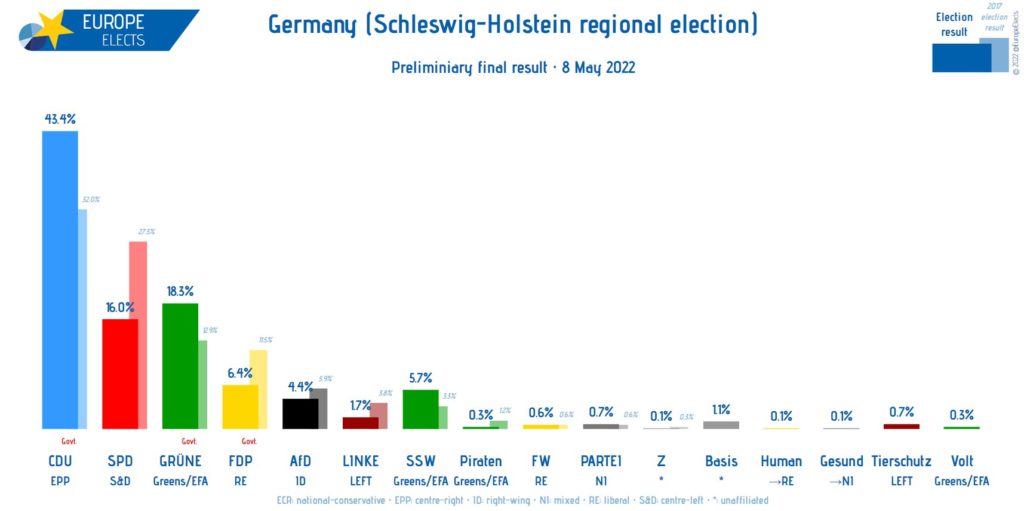Germany’s northernmost region is best known to the British for giving its name to the “Schleswig-Holstein Question” — a 19th century territorial dispute between Denmark and Prussia. Lord Palmerston wearily declared that “only three people have ever really understood the Schleswig-Holstein business – the Prince Consort, who is dead – a German professor, who has gone mad – and I, who have forgotten all about it.”
In 1864, the Prussian Minister-President, Otto von Bismarck, settled the matter by invading Denmark. His emphatic military victory paved the way for the unification of Germany — and all the unpleasantness that followed.
Fast forward to 2022 and it is Russia, not Prussia, trying to settle disputes through invasion. Nevertheless, the consequences can be felt all over Europe, including Schleswig-Holstein. On Sunday, the region held a state election and the result was a disaster for the Social Democrats (SPD) — the party of the German Chancellor, Olaf Scholz.

While the Christian Democrats took a commanding lead, the Social Democrat vote share plummeted from 27.3% to 16% — the party’s worst result in the state since the Second World War. This begs a new Schleswig-Holstein question: why has the SPD done so badly?
The Chancellor’s allies are trying to deflect blame, insisting that “there is no Olaf Scholz in this defeat.” However, the contest is being seen by others as a test of the federal government’s response to Russia’s invasion of Ukraine.
Certainly, there’s a contrast between the drop in the SPD vote and the gains made by the Greens — the most pro-Ukrainian party in the federal government coalition. Another notable outcome of the Schleswig-Holstein election is that support for the far-Right AfD has dipped below 5% — meaning that it will lose all of its seats in the regional parliament. The anti-NATO Left Party also did badly, losing more than half its already meagre support.
Though the government of Olaf Scholz cannot be described as anti-NATO, his leadership on the Ukraine crisis has been widely criticised. Last week, he was further embarrassed when the leader of the opposition Christian Democrats, Friedrich Mertz, travelled to Ukraine to meet President Zelenskyy — a trip that Scholz has yet to make himself.
The banning of Ukrainian flags by Berlin police this weekend will only reinforce the impression that Germany is the weakest link in the fight against Russian aggression. What German voters think about that is becoming clearer.








Join the discussion
Join like minded readers that support our journalism by becoming a paid subscriber
To join the discussion in the comments, become a paid subscriber.
Join like minded readers that support our journalism, read unlimited articles and enjoy other subscriber-only benefits.
SubscribeGermany’s business interests proved more influential than a mere election.
I was born in Schleswig-Holstein and my family still lives there. It is very unlikely that the war in Ukraine played a major role in the outcome of this election. It is and has always been, as in other federal states, the popularity of the main candidates. Daniel Günter, leader of the CDU and the incumbent, is simply unbeatable in the popularity scores. I cannot even recall the name of the SPD leader. My mum, a lifelong SPD supporter, voted CDU this time and I am sure Ukraine had nothing to do with it.
I don’t think “the banning of Ukrainian flags” claim is justified by the Mail story. Germany has understandable issues with “flags and military symbols” and that’s what they didn’t allow. All I know of this is what’s in the Daily Mail, but it seems reasonable to assume that the police would also have confiscated Russian flags.
Confirmation bias is a terrible thing.